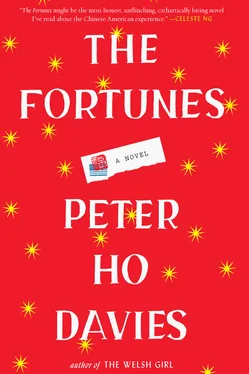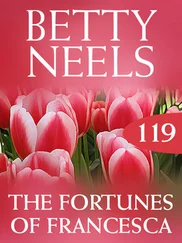He feels the bartender’s eyes on him now. Through the windows the city lights blink back at him. He realizes he can’t bear to see Pearl walk out of the bar, and he swallows quickly, sets his empty glass down too hard.
And yet he can’t go back up to the room, to his sleeping wife. He stands in the chill, blazing lobby, catches his reflection in the glass of the doors, his hair tufted and twisted into cockeyed horns.
The liveried doorman, hands in his sleeves, gives him a questioning look, but John shrugs and the man bows him out into the night. John waves back, the Little Red Book still in hand.
It’s not a “dark and normy” night, at least. If it’s even night still. He looks at his watch and sees that it’s almost five. It’s still dark, though, or perhaps just overcast. Neon shimmers in the smog. John knows it comes from the factories and power plants that ring the city — not to mention the scooters that seem to outnumber the bicycles he expected, and the cars (many of them American) — but he can’t help thinking it’s a byproduct of all the smokers in China. As if the air weren’t bad enough for their lungs.
And this too is what they’re saving their girls from: pollution. Every Chinese crowd contains its share of people in surgical masks, looking less like doctors somehow than outlaws. John has seen at least one fellow smoking a cigarette through a hole in his mask, several others pulling theirs down to hawk wetly on the sidewalk.
No one, he reflects, slipping the Little Red Book in his pocket, ever says they’re saving the girls from communism. They’re careful in general not to talk much politics. They’ve been warned not to by the adoption agency, told not to ask the guides awkward questions that could make them uncomfortable or even get them in hot water. Not one of them has asked about the student protests in Tiananmen Square. The largest square in the world, Napoleon told them, with room for over a million people, and yet nowhere in that vastness was there room for a mention, let alone a memorial to the protestors. Tank Man was less recognizable in China than in America. That’s what he wants to tell Norman and the rest. And you think I’m the inauthentic one?
Only once, when a line of black Audis, taut as a train of kites, had overtaken them on the highway, each car flying small red flags, had someone — Alice, maybe — asked Napoleon, “Party officials?” But she’d shaken her head, laughed. “Wedding party.” They’d watched the cars streak ahead in chastened silence.
A pickup rattles by John now, its bed packed with cages of sleeping chickens on their way to market.
The streets are quiet at this time of day, and John, for a change, can walk without drawing a crowd. Their party as a whole tends to attract attention, but he’s hoped that alone, he might blend in, feel for once in his life invisible. This is what he needs, he thinks, to get away from the group, to figure things out for himself. He and Nola don’t need to adopt for the same reasons as the rest, in the same way as the others, right? And yet even when he’s slipped away from their tour he knows he stands out. His clothes are wrong, of course, but probably there are other little things too. He remembers on another trip to Singapore — he’d taken Nola after they were married — a cousin had pointed out that the gold in his wedding band wasn’t yellow enough; the Chinese favored a very bright gold. And that he was too short. Too short! That may be why few people speak to him in Chinese here; the only ones who seem to assume he knows the language are in his own party. Those locals who do talk to him speak louder and slower, as if he’s an idiot. Others seem to feel he’s just rude. If anything, he’s more stared at than invisible.
In America, growing up, he always felt burdened by his Chinese appearance. Here in China, like a wish granted by an ironic deity, he’s white. He thinks enviously of a trip he and Nola took to Ireland a few years ago, how he’d recognized her complexion everywhere. He’d thought it would be like that.
On the empty streets he’s free for once at least to look around at his leisure. He’s spent so long looking up, over the heads of the crowd, peering at the sights, it’s a relief to look around close up, at ground level. Besides, looking up makes him dizzy — the drink working on top of his tiredness. He feels a little like one of those steel balls in a tilting maze. He peers down alleys and into parking lots, at the front stoops of stores, before he grasps what he’s doing. Stan had told them that their first daughter, Lily, had been found in a box outside a post office. He and Bev have been back there — to the “finding place,” as Bev calls it, dabbing a Kleenex to her eyes — and taken photos to show Lily. They plan to bring her back on their next trip, but they wanted to take photographs in case the buildings are torn down, the area redeveloped. Everywhere they go new towers are rising, cocooned in scaffolding and nets. “China is gonna be great when they finish it,” as the joke goes.
John himself has read accounts of babies being found outside stores, in marketplaces, at railway and bus stations, in the lobbies of hotels even. Foundlings, he thinks, the word so oddly Dickensian (and he suddenly recalls, as a child, wishing he were an orphan, telling his shocked mother, They always have the best adventures ). The locations are taken as signs of love. The parents want the babies found quickly. Many are said to be rural women — it being harder to keep a pregnancy secret in the city — who take a risk coming into the city to leave the child somewhere where it’ll be found, as opposed to abandoning it in a remote location to die. The mothers, it is surmised, must often wait, hidden, to make sure their babies are found. One account even has it that adoptive parents have had babies thrust into their arms in parking lots or come across babies under bushes.
And this, John realizes, stopping short, is what he’s looking for, why he’s out walking at this ungodly hour. He’s hoping to catch a glimpse of such a moment… and then what? Claim the child? Pursue the mother? And ask her what, even if he could communicate with her? And yet he finds himself holding his breath as he looks into corners and shadows. It’s like some treasure hunt. And then it comes to him that what he’s really looking for is some sign. This whole process is so managed, so bureaucratic; he’s looking for an accident, for fate to intervene. Not that he could even keep any baby he found; he knows that. But still, irrationally, he finds himself looking.
If a Chinese mother pressed her baby into his arms, even if he couldn’t keep that baby, he’d feel chosen somehow, as if someone thought he could be a father.
But the only young women who beckon him from the shadows are hookers. One bares her breast as he approaches and he hurries on, floaty with tiredness.
On the way back to the hotel he begins to hear birdsong, the dawn chorus, even if he hasn’t detected the change in the light himself. He tries to look for the birds, to identify the species, but the trees and telegraph lines are empty. And then he locates the sound, coming from the blocks of flats above him; each balcony he sees has a small cage hanging from it, and he remembers the songbird market they saw in Beijing, the tiny birds, little more than chicks, huddled in their bamboo cages.
The sun rises weakly. It seems smaller, more distant through the haze than at home, as if he’s not on a different continent but on another planet altogether. In a park he glimpses old people practicing tai chi, singly and in pairs, between the trees, their slow movements so oddly intimate he feels as if he’s intruding. A sound like firecrackers makes him jump, but when he looks he sees it’s a man whipping a wooden top in a square. The streets begin to grow busy, and he feels self-conscious, like a thief revealed in daylight. He finds himself hurrying back to the hotel, relieved to see its neon signage. Near the entrance there’s a row of shop-houses in an arcade. It’s meant to look traditional, even though the goods on sale are souvenirs, Western snacks, the prices too high for any locals. A cleaner dozes on his broom in a doorway, and John feels a pang of envy. One of the stores is just opening and John sees the owner, a genial fellow he’s heard others refer to as Charlie Chin, on account of the hairy mole sprouting there, setting out his wares. He’s hanging packs of disposable diapers from hooks overhead with the help of a pole. Charlie has no English to speak of — he holds up a calculator to show people prices — but his sales pitch is a jovial Adopt me! (They’ve theorized that someone — some earlier new parent — explained their baby as an “adoptee” and he misheard.) He regales John with it now, a joke that also seems like a greeting, and before he knows it John has called back, “Adopt me! ” and the man nods and smiles with delight.
Читать дальше












